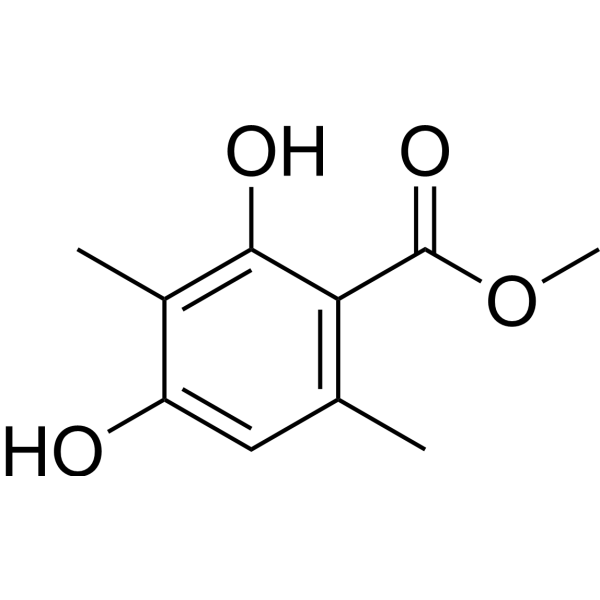Atraric acid (Synonyms: Methyl atrarate) |
| Catalog No.GC66207 |
El Ácido atrÁrico (atrarato de metilo) es un antagonista especÍfico del receptor de andrÓgenos (RA) con efectos antiinflamatorios y anticancerÍgenos. El Ácido atrÁrico reprime la expresiÓn del gen del antÍgeno prostÁtico especÍfico endÓgeno en las células LNCaP y C4-2. El Ácido atrÁrico también puede inhibir la sÍntesis de NO y citoquinas, y suprimir la vÍa de seÑalizaciÓn MAPK-NFκB. El Ácido atrÁrico se puede utilizar para investigar enfermedades de la prÓstata y enfermedades inflamatorias.
Products are for research use only. Not for human use. We do not sell to patients.

Cas No.: 4707-47-5
Sample solution is provided at 25 µL, 10mM.
Atraric acid (Methyl atrarate) is a specific androgen receptor (AR) antagonist with anti-inflammatory and anticancer effects. Atraric acid represses the expression of the endogenous prostate specific antigen gene in both LNCaP and C4-2 cells. Atraric acid can also inhibit the synthesis of NO and cytokine, and suppress the MAPK-NFκB signaling pathway. Atraric acid can be used to research prostate diseases and inflammatory diseases[1][2].
Atraric acid (10 μM; CV1 cells) represses the transactivation function mediated by Dihydrotestosterone-induced human AR[1].
Atraric acid (10 μM; PCa cells) inhibits the expression of the PSA gene in both androgen-dependent and androgen-independent PCa cells[1].
Atraric acid (1-300 μM; 24 h) dose-dependently inhibits pro-inflammatory cytokine, nitric oxide, prostaglandin E2 in LPS-stimulated RAW264.7 cells, but does not influence the cell viability[2].
Atraric acid (100 and 300 μM; 18 h or 4 h) downregulates the expression of phosphorylated IκB, extracellular signal-regulated kinases (ERK) and nuclear factor kappa B (NFκB) signaling pathway to exhibit anti-inflammatory effects in LPS-stimulated RAW264.7 cells[2].
Cell Viability Assay[2]
| Cell Line: | RAW264.7 cells |
| Concentration: | 1-300 μM |
| Incubation Time: | 24 h |
| Result: | Did not influence the cell viability. |
Western Blot Analysis[2]
| Cell Line: | RAW264.7 cells |
| Concentration: | 100 and 300 μM |
| Incubation Time: | 18 h or 4 h |
| Result: | Inhibited LPS-Induced expression of iNOS and COX-2 in a dose-dependent manner. Suppressed LPS-stimulated phosphorylation of the Nfκb signaling pathway. |
Atraric acid (10, 30 mg/kg; i.p.; single dosage) inhibits the production of pro-inflammatory cytokines and reduces pathological damages in LPS-induced endotoxin shock mice[2].
| Animal Model: | Female BALB/c mice (7 weeks old, 17-20 g; LPS-induced endotoxin shock)[2] |
| Dosage: | 10, 30 mg/kg |
| Administration: | i.p.; single dosage |
| Result: | Inhibited the production of pro-inflammatory cytokines. Reduced pathological damages such as vasodilation and bleeding. |
Average Rating: 5 (Based on Reviews and 30 reference(s) in Google Scholar.)
GLPBIO products are for RESEARCH USE ONLY. Please make sure your review or question is research based.
Required fields are marked with *




















